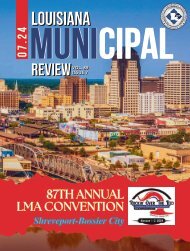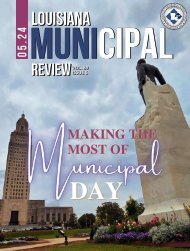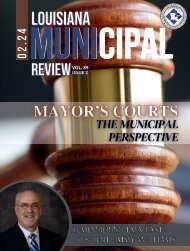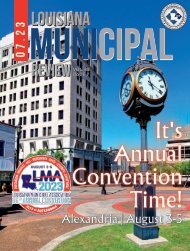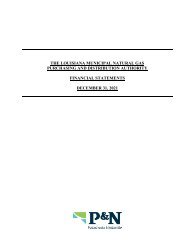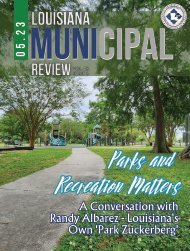Create successful ePaper yourself
Turn your PDF publications into a flip-book with our unique Google optimized e-Paper software.
You Are Under Arrest!<br />
BY JERRY CRONIN, RMI GENERAL MANAGER<br />
So that there is no misunderstanding<br />
as to the attitude with which<br />
I undertake penning this article,<br />
please know that, without exception,<br />
I sincerely believe that a law<br />
enforcement officer, carrying out<br />
his/her daily assignment, has not only the right, but the<br />
duty, to do all that is necessary and legal to return home<br />
safely at the end of their tour of duty.<br />
Louisiana Code of Criminal Procedure Articles 201<br />
through 233 provide an expansive codification of the<br />
rationale for making an arrest, as well as the duties of<br />
the arresting officer(s). These articles also provide the<br />
rationale for summons and detention, and the provisions<br />
for arrest by a private person. Further, these articles<br />
detail the discretion an officer has when determining<br />
whether to make an arrest or to issue a summons in each<br />
situation, and authorize the right to use necessary force<br />
to make an arrest.<br />
Despite these clear definitions/instructions, each year<br />
there are numerous petitions filed claiming that the<br />
petitioner was falsely arrested and/or was subjected to<br />
excessive force while being arrested, which must be resolved<br />
by either judicial action or negotiated settlement.<br />
When the petitioner is convicted of, or pleads guilty to,<br />
the charges forming the basis for the arrest, the false<br />
arrest issue becomes moot; however, the excessive force<br />
claim may remain a viable issue to be decided by the<br />
judge or jury.<br />
Sadly, in many cases, the criminal charges are not prosecuted,<br />
leaving the municipality and the arresting officer<br />
in jeopardy on the issue of false arrest.<br />
The Code of Criminal Procedure also states that, “a person<br />
shall peacefully submit to a lawful arrest”, thereby<br />
establishing their obligation to obey the law. Yet their<br />
failure to “peacefully submit” seems to be overlooked or<br />
downplayed in some cases, while, simultaneously, the officer’s<br />
actions are strictly scrutinized under the required<br />
legal standard.<br />
Let’s first deal with the issue of failure to prosecute: is<br />
this decision reasonable? If the officer has failed to execute<br />
a lawful arrest, or fails to provide sufficient documentation<br />
of the offense to support the charge for which<br />
the arrest occurred, the decision to not prosecute is<br />
principled. Otherwise, considering the consequences to<br />
the municipality and the officer, the failure to prosecute<br />
doesn’t seem appropriate.<br />
A Word from<br />
Our Affiliates<br />
The issue of excessive force can be complicated because<br />
while the officer is permitted to use whatever force is<br />
reasonable and necessary to overcome resistance of the<br />
individual, that decision must be made by the officer<br />
based on the perception and judgment of immediate,<br />
cogent circumstances – often in a split second. This is<br />
a critical consideration in excessive force claims since<br />
hindsight and after-the-fact analysis can alter what the<br />
officer would have done had he/she had exhaustive facts<br />
and time to make the decision.<br />
In the months and years following an incident, litigation<br />
may unfold. Because delays are permitted for filing an<br />
action and serving notice, it is critically important that<br />
the entity insuring or indemnifying the municipality be<br />
notified immediately of incidents that will likely result<br />
in future civil action. Further, the successful defense of<br />
a claim for damages will strongly depend on detailed<br />
reporting of all that was said and done by all parties,<br />
witness statements, and available audio and/or video<br />
evidence of the incident.<br />
Diligence in collecting and preserving all evidence –<br />
good and bad – is essential for bringing the claim to a<br />
proper resolution. Equally important are the officer’s<br />
ability to demonstrate professionalism and the officer’s<br />
credibility on the stand.<br />
Providing additional guidance, the Code obliges an officer<br />
to “advise fully the reason for his arrest.” Failure to<br />
adequately advise a subject has, in some cases, justified<br />
subsequent resistance. It appears, then, that clarification<br />
of the officer’s rationale behind an arrest would be helpful<br />
to gain peaceful submission.<br />
Although I have never been arrested, I believe that the<br />
moment is fraught with emotion for the subject, regardless<br />
of the actions giving rise to the arrest. For the<br />
officer, executing an arrest may also be an emotional experience,<br />
depending on the circumstances preceding the<br />
arrest. However, as a law enforcement professional, the<br />
officer is expected to maintain emotional control. The<br />
demeanor, tone, and attitude of the officer may go a long<br />
way toward defusing a very bad situation and fostering a<br />
peaceful outcome.<br />
The officer can do everything right and the arrest may<br />
still go awry. In those cases, it is the job of defense counsel<br />
to ensure that the court/jury understand that the officer<br />
was faithfully performing his/her duty and exercising<br />
his/her right to return home safely.<br />
If you have questions concerning this article contact me<br />
at Risk Management, Inc.<br />
<strong>LMR</strong> | <strong>October</strong> 2017 Page 11



